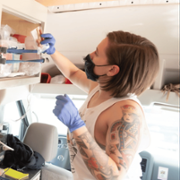Learn About Building and Creating Syringe Service Programs with Our Newest Training
By Tasha Turner-Bicknell, DNP, RN, CDH | June 18, 2024
Associate Professor & Director of Advanced Public Health Nursing DNP & Certificate Programs, University of Cincinnati
People who use drugs (PWUD) are at an increased risk for bloodborne infectious diseases, such as HIV and Hepatitis C. Injection behavior, such as syringe sharing, continues to be one of the most prominent reasons associated with bloodborne infectious diseases. Harm reduction techniques, such as syringe service programs (SSPs), are shown to address this elevated risk in the population of PWUD. Syringe service programs provide local, easy-to-access services where clients can obtain sterile syringes, injection materials, safer smoking kits, naloxone, and condoms. Syringe service programs provide an opportunity to engage PWUD and provide individuals with crucial services such as HIV testing, medical care, housing support, and treatment for substance use disorder to achieve health equity for this community.
While syringe service programs have long been identified as an evidence-based public health and harm reduction intervention, the implementation of SSPs have been sparse in the United States until recently. The Centers for Disease Control and Prevention (CDC) recognizes that many communities may want to open a syringe program but may not know where to start. As a result, The CDC has partnered with ETR’s EVOLVE project team to create a comprehensive SSP training that will provide critical guidance to all people working in SSPs, from those doing grassroots outreach to administrators responsible for running large programs.
Read on below for a snapshot on what’s discussed in the course, including insights from harm reduction experts on the ground!
Building and Strengthening Syringe Service Programs
ETR’s new asynchronous online course, Building and Strengthening Syringe Service Programs, provides training on starting an SSP, monitoring, and evaluating the program as it grows. ETR has assembled some of the most experienced harm reductionist professionals in the country to create a uniquely authentic course that presents evidence-based practices, needs-based distribution, and peer-to-peer outreach, in the context of the complex environment of operating an SSP. The course includes interviews with experts working in syringe service programming from around the country, and input from subject matter experts with direct experience in SSP delivery.
Trainees will hear firsthand from people working in SSPs through recorded interviews where experienced SSP providers talk about some of their biggest wins and most formidable challenges as they continue to do this work.
The Building and Strengthening Syringe Service Programs course provides a behind-the-scenes look at the details of running an SSP. Evidence-based models are presented in an easily digestible format with summaries provided on essential takeaway information to help learners apply knowledge in their programs. The training includes applicable, skill-based modules on practices such as data collection, centering client needs, engaging peers, and sustaining funding to provide trainees with a framework for success that evolves from a people-first perspective.
The training offers the opportunity to hear from voices from the field to provide authentic, real-world examples of how programs work to serve the needs of their population while navigating often uncertain sociopolitical climates and the ever-changing demands of securing funding.
The asynchronous format of this online course means it can be completed at the learner's own pace when it is convenient for them. This makes the course a great fit for rural and/or geographically isolated communities that may find it challenging or cost-prohibitive to attend in-person trainings. Learners are also encouraged to explore additional resources such as those provided by the National Harm Reduction Coalition and NASTAD (National Alliance of State and Territorial AIDS Directors). Additionally, toolkits, best-practice guidelines, and peer-reviewed research articles are provided to support the ongoing success of trainees after they have completed the course.
Building and Strengthening Syringe Service Programs provides essential training and support to individuals and communities wanting to provide an evidence-based response to substance use in their community. ETR is dedicated to offering low-barrier services, resource referrals, and a place for community among people who use drugs. Research indicates SSPs can save lives and reduce illness. Additionally, SSPs allow for an opportunity to decrease stigma, build trusting relationships, and improve access to healthcare in our local communities.
In conclusion, there is strong evidence to support that Syringe Service Programs work directly to reduce social determinants of health for PWUD. To learn more about social determinants of health, check out ETR’s Health Equity Framework. The framework illustrates how health outcomes are influenced by complex interactions between people and their environments, featuring interactive media, articles, tools for community organizations, and more!
Want to learn more about Syringe Service Programs and Health Equity?
Watch our 3 in 30 on Building Syringe Service Programs On-Demand!
This webinar discusses what you may consider when starting an SSP and where to learn more in-depth strategies to grow and sustain your SSP work.
In this conversation, ETR is by two guest experts: Tasha Turner-Bicknell, Associate Professor and Director of Advanced Public Health Nursing DNP and Certificate Programs at the University of Cincinnati College of Nursing, and Melissa Hernandez, Executive Director of the PR Project. Watch on-demand here.
Take our course developed by ETR’s EVOLVE project team for free on CDCTrain!
How to access the course:
New to CDC TRAIN?
1. Create a CDC TRAIN account.
2. Join the HIVCBA Learning Group.
3. Launch the course.
Already on CDC TRAIN?
1. Launch the course.
Dr. Turner-Bicknell is Associate Professor and Director of Advanced Public Health Nursing DNP and Certificate Programs at the University of Cincinnati. A harm reductionist, population health nurse, and member of the board of directors for Harm Reduction Ohio, she has extensive experience in harm reduction including syringe service programs, overdose prevention, capacity building, mobile outreach, and legislative advocacy. She currently partners with Caracole Greater Cincinnati HIV Services Organization in their harm reduction vending machine and works to build the capacity for harm reduction service delivery.




